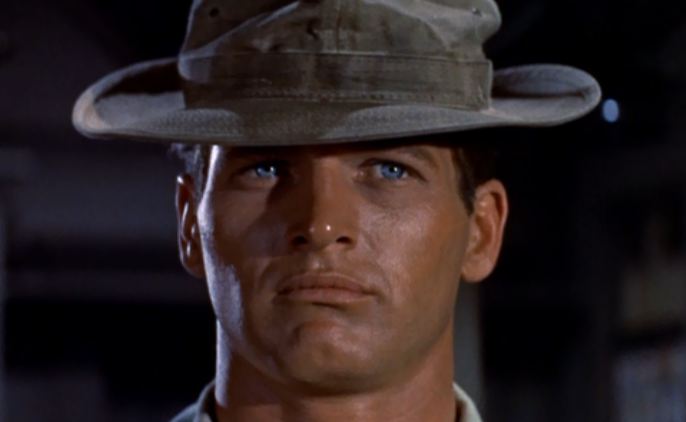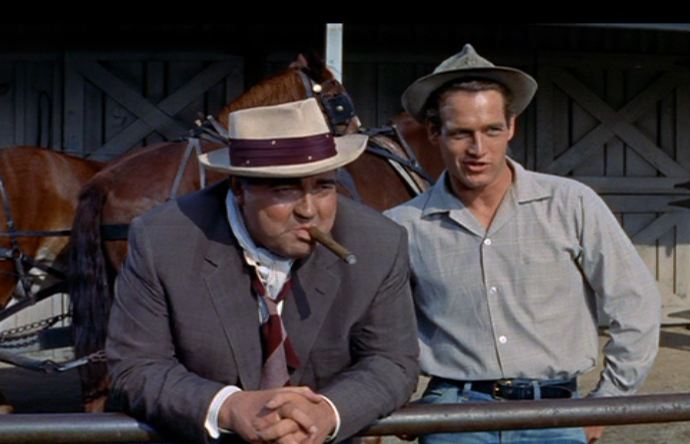I watched The Long Hot Summer hoping — like Joanne Woodward — to get lost in Paul Newman’s dazzling blue eyes. Sadly, Orson Welles’s prosthetic nose proves to be the major distraction in this would-be steamy melodrama filled with mindless chatter and annoying Deep South accents.
In 1958 Newman was arguably at the height of his matinée idol beauty. It was the year he played Billy the Kid in Arthur Penn’s The Left-Handed Gun, and he was also impressive as the alcoholic Brick Pollitt in Cat on a Hot Tin Roof. Like Tennessee Williams’s play, The Long Hot Summer is set in Mississippi and features an overbearing patriarch who’s obsessed with perpetuating his dynasty.
Big Daddy in Cat did, at least, have that gaggle of “no-neck monsters” to coo over. Here, Welles’s big-shot businessman Will Varner has yet to see any issue from the marriage of his ineffectual son Jody (Anthony Franciosa) to the flirtatious Eula (Lee Remick). Then there’s his school-teacher daughter Clara (Woodward), who’s in danger of turning into an old maid (well, she’s only 23) as she engages in a fruitless pursuit of the terminally dull Alan Stewart (Richard Anderson).
The arrival of Newman’s Ben Quick should have lit a match under this cauldron of frustrated passions. As we see in the pre-credits sequence, Quick is a guy who enjoys a good blaze. He’s a notorious barn-burner who’s been sent packing by his outraged neighbours, and ends up in the small town of Frenchman’s Bend looking for a fresh start. The sceptical Clara thinks he looks “mean and dirty”, but it’s not long before he’s ingratiating himself with Will, who recognises the spark of ambition that’s so lacking in his own son.
Quick lives up to his name and soon graduates from farming, to trading horse-flesh and then running Varner’s store — leaving Jody feeling decidedly surplus to requirements. But Will makes no secret of his long-term plan, which is to find a suitable husband for the independent-minded Clara. He thinks Quick is a much better prospect than her current beau, Alan. The course of true love is, needless to say, littered with angry words, bruised egos and (yes) burning buildings.
Martin Ritt went on to direct Newman in five more films, including Hud and Hombre. For me, this glossy but badly paced drama is one of their weaker collaborations. There’s not enough screen time for real-life couple Newman and Woodward, who married in January 1958, shortly before this film was released. Woodward gives the sort of intelligent and well-modulated performance you’d expect from an actress who’d just won an Oscar (for The Three Faces of Eve). But her watchful Clara feels as though she belongs in a different movie from the scene-chewing Welles, the miscast Franciosa and the downright irritating Remick.
There are a handful of good scenes between Newman and Woodward — their first kiss in the store late at night, an abortive attempt at a picnic and a heartfelt confession near the end. But I never felt that their relationship was the main event here. That’s because the screenplay, adapted from stories by the Nobel prize-winning novelist William Faulkner, gives too much emphasis to Jody’s adolescent whining about being supplanted by Quick in his father’s affections. It’s unconvincingly played by Franciosa and culminates in a ludicrous attempt at arson/murder, for which he’s immediately forgiven. Apparently, a sure-fire way to win back your Dad’s affections is to barbecue him along with the horses.
With a great cast, attractive location photography by Joseph La Shelle and a lovely score from Alex North (Spartacus), The Long Hot Summer should have been an enjoyable big-budget romantic drama. But for much of the time it feels as languid as Anderson’s “sissy” Alan, until a burst of action in the final 15 minutes, when Welles’s big “V” clumsily attempts to fix all his problems and Quick is forced to make a rapid escape.
I’d watch Newman reading from the telephone directory, but his character feels more mischievous than genuinely conflicted: this seems rather at odds with what we later discover about his background. Still, he does take his shirt off here, and when he flashes those baby blue eyes you can see why Woodward and generations of movie fans were smitten.





